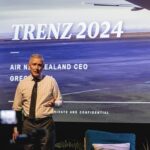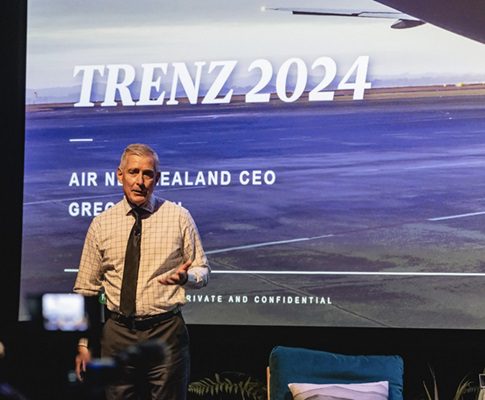 Air New Zealand chief executive Greg Foran is a man who is constantly monitoring every aspect of the airline he runs.
Air New Zealand chief executive Greg Foran is a man who is constantly monitoring every aspect of the airline he runs.
Speaking at TRENZ in Wellington yesterday, Foran revealed that his office contains a screen that diagrammatically shows all phone calls coming into the airline, including the length of time callers spend waiting for an answer.
Last week, Foran disclosed that the average wait time was 43 seconds.
The Air New Zealand chief outlined the carrier’s work behind the scenes, such as augmenting its call centre technology with artificial intelligence and using other means to speed things up.
Foran said that in the air, the airline now allows passengers to bring their own coffee cups aboard—and 15% now do so. This innovation reduces waste.
On the flight decks, flight crew use tablets, which eliminates paperwork. As a result, the flight planning process takes five minutes.
Air New Zealand is also trialling all-electric aircraft, which will initially carry cargo only. It has selected Wellington and Marlborough Airports as the first to receive them. Last year, Air New Zealand announced the purchase of its first next-generation aircraft for this purpose, the all-electric ALIA CTOL from Beta Technologies. The airline will initially operate a cargo-only service in partnership with NZ Post.
The airline faces challenges, including problems not of its own making, such as those affecting Pratt and Whitney engines worldwide.
Last year, Pratt & Whitney disclosed a condition affecting the maintenance plan for the Geared Turbofan (GTF) jet engine fleet. It is affecting up to 700 engines globally over three years.
“Air New Zealand has 17 A320/321NEO aircraft in its fleet of 108 aircraft, serving Australia, the Pacific Islands and domestic New Zealand. While this maintenance issue does not present a safety issue, it has caused Air New Zealand to revise its flight schedule as a result of adjustments made to the engine maintenance plan,” Foran said at the time.
The cost of jet fuel is a challenge for airlines worldwide, and Air New Zealand is no exception. Foran said that every dollar the fuel price fluctuates makes a difference of $12 million to the airline. As a result of this and other inflationary pressures, he conceded: “I think it’s going to be a challenge to see prices come down on a normalised basis.”
Written by: Peter Needham in Wellington, New Zealand
















